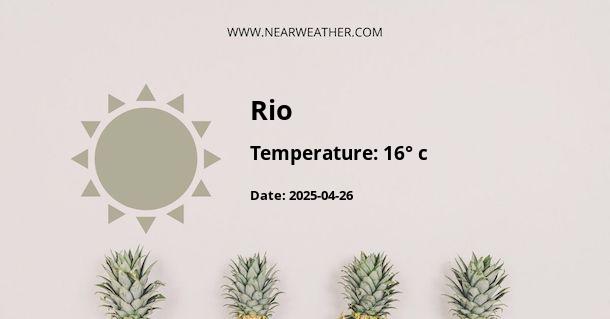Introduction
Rio de Janeiro, often referred to simply as Rio, is a bustling city in Brazil known for its magnificent landscapes, beautiful beaches, and vibrant culture. But one of the factors that makes Rio a popular destination among tourists worldwide is its climate. The city experiences a tropical monsoon climate with a generous amount of sunshine all year round.
Climate of Rio de Janeiro
The tropical monsoon climate experienced in Rio de Janeiro is characterized by warm temperatures throughout the year, with a significant amount of rainfall during the summer months. The city's coastal location ensures a steady sea breeze that helps to moderate the temperatures.
The average annual temperature in Rio is around 23°C (73°F), with the warmest month being February and the coolest month July.
Month-by-Month Weather Overview
Let's delve deeper into the month-by-month weather patterns in Rio to give you a more detailed understanding of the climate.
Summer (December to March)
The summer in Rio de Janeiro occurs from December to March. During this period, the city experiences its highest temperatures, with averages ranging from 25°C (77°F) to 30°C (86°F). Summer is also the wettest season in Rio, with January typically being the rainiest month.
Autumn (April and May)
Autumn in Rio happens in April and May. During this time, the weather starts to cool down a bit, with average temperatures ranging from 22°C (72°F) to 28°C (82°F). The rainfall also starts to decrease in autumn.
Winter (June to September)
Winter in Rio spans from June to September. Despite being the 'coolest' season, the temperatures remain relatively mild, ranging from 20°C (68°F) to 25°C (77°F). Winter is the driest period in Rio, with July typically being the driest month.
Spring (October and November)
In Rio, springtime happens in October and November. During this period, the temperatures start to increase again, with averages ranging from 22°C (72°F) to 28°C (82°F). The rainfall starts to increase during this season as well, getting ready for the wet summer season.
Rio's Weather and Tourism
The climate of Rio de Janeiro plays a significant role in its tourism industry. The warm, tropical climate is a major attraction for tourists, especially those from cooler climates. The city's famous beaches, including Copacabana and Ipanema, are most popular during the hot summer months. However, the milder winter temperatures and lower rainfall also make it an ideal time for outdoor activities such as hiking and sightseeing.
Note: The climate and weather can vary slightly from year to year. Therefore, it's always a good idea to check the current weather forecast before planning your trip to Rio de Janeiro.
Climate Change Impact on Rio's Weather
Like other locations around the globe, Rio de Janeiro is not immune to the impacts of climate change. Rising global temperatures are predicted to lead to a hotter, wetter climate in Rio. This may result in more frequent and severe weather events, such as heavy rainfall and storms. Such changes could have significant implications for the city's infrastructure, economy, and tourism industry.
Conclusion
In conclusion, Rio de Janeiro offers a warm, tropical climate that appeals to tourists year-round. The city's weather patterns are characterized by hot summers and mild winters, with a significant amount of rainfall occurring during the summer months. As the impacts of climate change continue to unfold, it's essential to keep an eye on how these changes might affect Rio's weather in the future.
A - Rio's Latitude is 38.299999 & Longitude is 21.783331.
A - Weather in Rio is 16° today.
A - Climate Conditions in Rio shows light rain today.
A - Humidity in Rio is 79% today.
A - Wind speed in Rio is 10.69 km/h, flowing at 206° wind direction. today.
